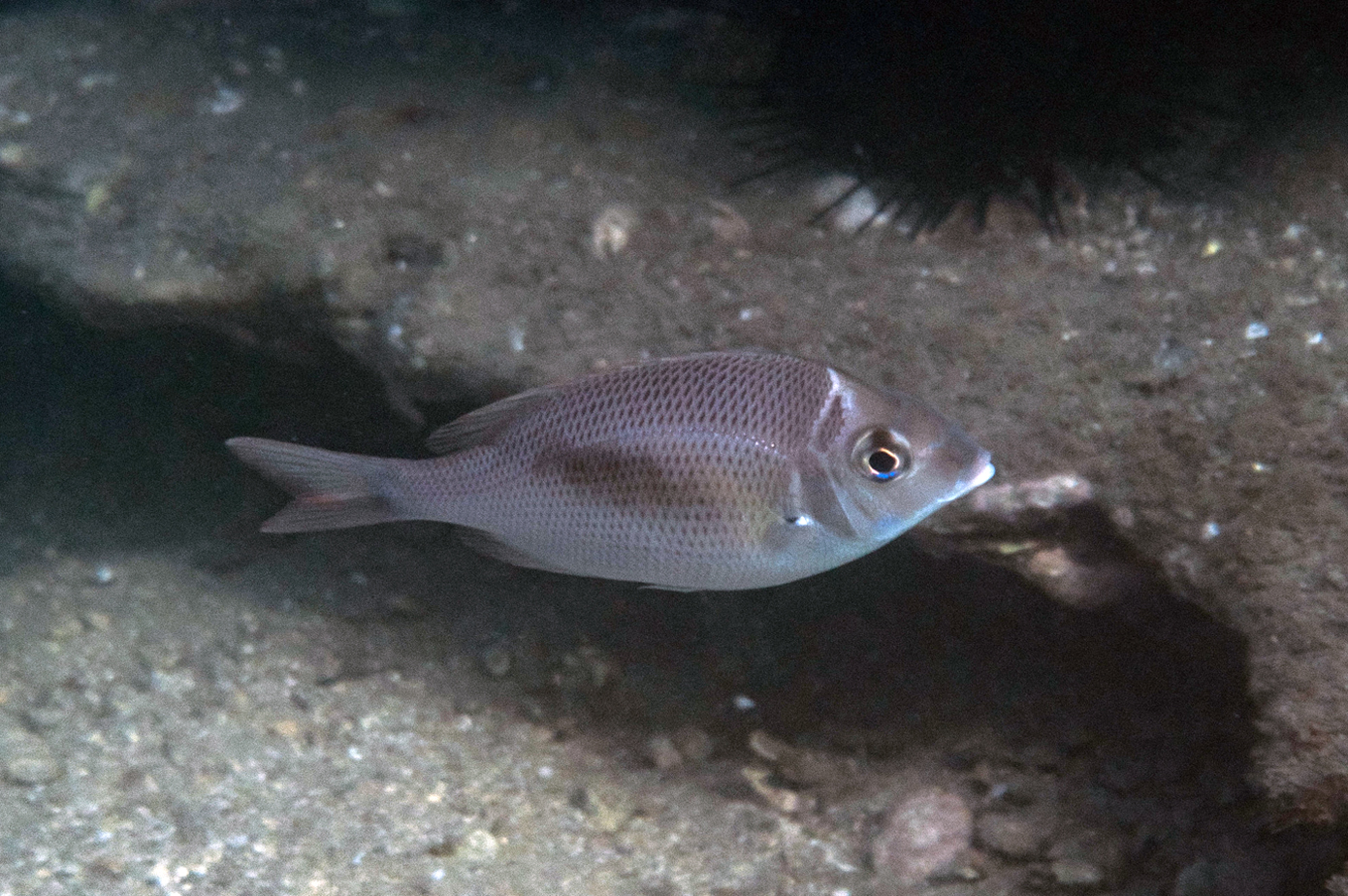Collar Seabream, Gymnocranius audleyi Ogilby 1916
Other Names: Bastard Bream, Collared Large-eye Bream, Collared Sea Bream, Collared Sea-bream, Coral Bream, Iodine Bream, Iodine Sea Bream, Pale-faced Bream, Sand Snapper

A Collar Seabream, Gymnocranius audleyi, at Manly, Sydney Harbour, New South Wales, January 2022. Source: biniek-io / iNaturalist.org. License: CC by Attribution-NonCommercial
Summary:
A pale silvery, olive or bronze seabream becoming paler or silvery-white below, with flecks on the side and spots on the scales often forming fine horizontal rows, yellowish fins, a distinctive darker scaled patch behind the upper part of the eye, a naked face, and a dark bar sometimes through the eye.
Cite this page as:
Bray, D.J. 2022, Gymnocranius audleyi in Fishes of Australia, accessed 28 Jun 2025, https://fishesofaustralia.net.au/home/species/2454
Collar Seabream, Gymnocranius audleyi Ogilby 1916
More Info
|
Distribution |
Eastern Australia, from the Great Barrier Reef off Port Douglas, to Sydney Harbour, New South Wales; also the Lord Howe Province in the Tasman Sea. Elsewhere the species occurs in the Chesterfield Islands and New Caledonia. Individuals inhabit sandy or rubble areas near reefs. |
|
Features |
Dorsal fin X, 10; Anal fin III, 9-10; Pectoral fin 14; . Inner surface of pectoral-fin base without scales. |
|
Colour |
Overall silver or whitish, often light brown or olive on upper sides; each scale on sides with a brown spot forming longitudinal rows, those on back darkest; top of head dull brownish or grey; cheek and opercle silvery, sometimes with a golden sheen; parietal scale patch (on side of nape, above and behind eye) blackish surrounded by a brilliant white margin; fins uniformly clear to slightly yellowish. Some individuals, especially those freshly dead, have scattered brown flecks on sides. Also a blackish bar running through the eye may be evident. |
|
Feeding |
Feeds mostly on benthic invertebrates. |
|
Fisheries |
The flesh sometimes has a distasteful iodine flavour, although untainted fish are reportedly good eating. |
|
Etymology |
Ogilby named the species "after my friend Audley Raymond Jones, to whom I am indebted for much interesting information regarding the habits of our fishes." |
|
Species Citation |
Gymnocranius audleyi Ogilby 1916, Mem. Qld Mus. 5: 170. Type locality: Snapper Banks, off Moreton Bay, Queensland. |
|
Author |
Bray, D.J. 2022 |
|
Resources |
Collar Seabream, Gymnocranius audleyi Ogilby 1916
References
Carpenter, K.E. 2001. Sparidae, Lethrinidae. pp. 2990-3050 in Carpenter, K.E. & Niem, V.H. (eds). The Living Marine Resources of the Western Central Pacific. FAO Species Identification Guide for Fisheries Purposes. Rome : FAO Vol. 5 2791-3379 pp.
Carpenter, K.E. & Allen, G.R. 1989. FAO Species Catalogue. Emperor fishes and large-eye breams of the world (family Lethrinidae). An annotated and illustrated catalogue of lethrinid species known to date. FAO Fisheries Synopsis. No. 125, Vol. 9. Rome : FAO 118 pp.
Carpenter, K.E., Lawrence, A. & Myers, R. 2016. Gymnocranius audleyi. The IUCN Red List of Threatened Species 2016: e.T16719359A16722315. http://dx.doi.org/10.2305/IUCN.UK.2016-3.RLTS.T16719359A16722315.en. Downloaded on 26 July 2018.
Cockerell, T. D. A. 1916. Some Australian fish-scales. Memoirs of the Queensland Museum 5: 52-57 (described as Gymnocranius bitorquatus type locality, Moreton Island, Qld) See ref at BHL
Grant, E.M. 1975. Guide to Fishes. Brisbane : Queensland Government, Co-ordinator General’s Department 640 pp. (as Gymnocranius bitorquatus)
Grant, E.M. 1991. Fishes of Australia. Brisbane : EM Grant Pty Ltd 480 pp. (as Gymnocranius bitorquatus)
Grant, E.M. 2002. Guide to Fishes. Redcliffe : EM Grant Pty Ltd 880 pp. (as Gymnocranius bitorquatus)
Johnson, J.W. 2010. Fishes of the Moreton Bay Marine Park and adjacent continental shelf waters, Queensland, Australia. pp. 299-353 in Davie, P.J.F. & Phillips, J.A. Proceedings of the Thirteenth International Marine Biological Workshop, The Marine Fauna and Flora of Moreton Bay. Memoirs of the Queensland Museum 54(3)
Kuiter, R.H. 1996. Guide to Sea Fishes of Australia. A comprehensive reference for divers and fishermen. Sydney, NSW, Australia : New Holland Publishers xvii, 434 pp.
Kulbicki, M., J.E. Randall, J.E. & Rivaton, J. 1994. Checklist of the fishes of the Chesterfield Islands (Coral Sea). Micronesica 27(1/2): 1-43.
Laursen, T., Russ, G.R., Newman, S.J. & Higgs, J.B. 1999. Age, Growth and mortality of Gymnocranius audleyi (Pisces: Lethrinide). Asian Fisheries Science 12: 187-200.
Marshall, T.C. 1964. Fishes of the Great Barrier Reef and Coastal Waters of Queensland. Sydney : Angus & Robertson 566 pp. 136 pls.
Newman, S.J. & Williams, D.McB. 2001. Spatial and temporal variation in assemblages of Lutjanidae, Lethrinidae and associated fish species among midcontinental shelf reefs in the central Great Barrier Reef. Marine and Freshwater Research 52: 843–851. https://doi.org/10.1071/MF99131
Ogilby, J.D. 1916. Edible fishes of Queensland. Parts 4–9. Memoirs of the Queensland Museum 5: 127-177 pls 14-23 See ref at BHL
Randall, J.E., Allen, G.R. & Steene, R. 1990. Fishes of the Great Barrier Reef and Coral Sea. Bathurst : Crawford House Press 507 pp. figs.
Randall, J.E., Allen, G.R. & Steene, R. 1997. Fishes of the Great Barrier Reef and Coral Sea. Bathurst : Crawford House Press 557 pp. figs.
Sato, T. 1986. A systematic review of the sparoid fishes of the subfamily Monotaxinae, p. 602–612, in T. Uyeno, R. Arai, T. Taniuchi, K. Matsuura (eds)Indo-Pacific fish biology: proceedings of the second international conference on Indo-Pacific fishes. Ichthyological Society of Japan, Tokyo.






